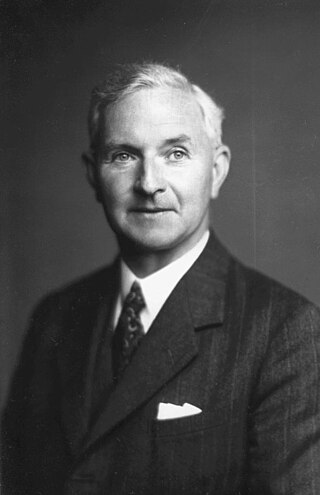
Sir John Edward Lennard-Jones was a British mathematician and professor of theoretical physics at the University of Bristol, and then of theoretical science at the University of Cambridge. He was an important pioneer in the development of modern computational chemistry and theoretical chemistry.

The Royal Society of Chemistry (RSC) is a learned society in the United Kingdom with the goal of "advancing the chemical sciences". It was formed in 1980 from the amalgamation of the Chemical Society, the Royal Institute of Chemistry, the Faraday Society, and the Society for Analytical Chemistry with a new Royal Charter and the dual role of learned society and professional body. At its inception, the Society had a combined membership of 34,000 in the UK and a further 8,000 abroad. The headquarters of the Society are at Burlington House, Piccadilly, London. It also has offices in Thomas Graham House in Cambridge where RSC Publishing is based. The Society has offices in the United States, on the campuses of The University of Pennsylvania and Drexel University, at the University City Science Center in Philadelphia, Pennsylvania, in both Beijing and Shanghai, China and in Bangalore, India.
The Faraday Society was a British society for the study of physical chemistry, founded in 1903 and named in honour of Michael Faraday. In 1980, it merged with several similar organisations, including the Chemical Society, the Royal Institute of Chemistry, and the Society for Analytical Chemistry to form the Royal Society of Chemistry which is both a learned society and a professional body. At that time, the Faraday Division became one of six units within the Royal Society of Chemistry.
The Chemical Society was a scientific society formed in 1841 by 77 scientists as a result of increased interest in scientific matters. Chemist Robert Warington was the driving force behind its creation.
The Ferrier rearrangement is an organic reaction that involves a nucleophilic substitution reaction combined with an allylic shift in a glycal. It was discovered by the carbohydrate chemist Robert J. Ferrier.
Physical Chemistry Chemical Physics is a weekly peer-reviewed scientific journal publishing research and review articles on any aspect of physical chemistry, chemical physics, and biophysical chemistry. It is published by the Royal Society of Chemistry on behalf of eighteen participating societies. The editor-in-chief is Anouk Rijs,.

Dalton Transactions is a weekly peer-reviewed scientific journal covering original (primary) research and review articles on all aspects of the chemistry of inorganic, bioinorganic, and organometallic compounds. It is published by the Royal Society of Chemistry and the editor-in-chief is Russell Morris. The journal was named after the English chemist, John Dalton, best known for his work on modern atomic theory. The journal was named a "rising star" in 2006.
Perkin Transactions is a scientific journal devoted to organic chemistry published from 1997 to 2002 by the Royal Society of Chemistry. It was split into Perkin Transactions I and Perkin Transactions II. The predecessor journals published by the Chemical Society before the merger of that Society with other Societies to form the Royal Society of Chemistry were the Journal of the Chemical Society, Perkin Transactions 1 and Journal of the Chemical Society, Perkin Transactions 2 (1972-1996). They were replaced by Organic and Biomolecular Chemistry. The name honours the chemist Arthur George Perkin.

William Henry Perkin Jr., FRS FRSE was an English organic chemist who was primarily known for his groundbreaking research work on the degradation of naturally occurring organic compounds.

Sir Jocelyn Field Thorpe FRS was a British chemist who made major contributions to organic chemistry, including the Thorpe-Ingold effect and three named reactions.
Iain Paul (1939–2012) was a Scottish chemist and theologian born in Glasgow, Scotland as the second world war was stirring. Iain and his sister were raised by their paternal grandparents attending Govan High School (1951–1957).
Andrew Norman Meldrum was a Scottish scientist known for his work in organic chemistry and for his studies of the history of chemistry. It has been claimed that Meldrum's acid "is the only chemical to be named after a Scotsman."

Howard E. Zimmerman was a professor of chemistry at the University of Wisconsin–Madison. He was elected to the National Academy of Sciences in 1980 and the recipient of the 1986 American Institute of Chemists Chemical Pioneer Award.

Sir Ewart Ray Herbert Jones FRS was a Welsh organic chemist and academic administrator, whose fields of expertise led him to discoveries into the chemistry of natural products, mainly steroids, terpenes and vitamins. His work also led to the creation of the Jones oxidation.
Alfred Hassner is an internationally known organic chemist.
Acta Chemica Scandinavica was a peer-reviewed Nordic scientific journal in the fields of chemistry. The journal was established in 1947 and was jointly managed during 53 years from beginning of 1947 until end of 1999 by the chemical societies in Denmark, Finland, Norway and Sweden. The journal was jointly owned by the four chemical societies through the Publishing Association Acta Chemica Scandinavica. The Swedish Chemical Society managed the administration of the Publishing Association at their Secretariat in Stockholm.
Usha Ranjan Ghatak (1931–2005) was an Indian synthetic organic chemist, stereochemist and the director of the Indian Association for the Cultivation of Science (IACS). He was known for his contributions in developing novel protocols of stereoselective synthesis of diterpenoids. He was an elected fellow of the Indian Academy of Sciences and the Indian National Science Academy. The Council of Scientific and Industrial Research, the apex agency of the Government of India for scientific research, awarded him the Shanti Swarup Bhatnagar Prize for Science and Technology, one of the highest Indian science awards, in 1974, for his contributions to chemical sciences.






